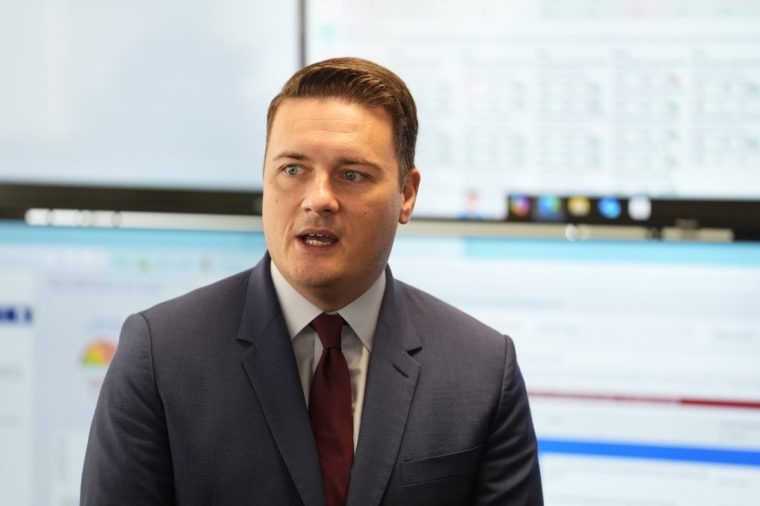Pharmadoctor, which provides paid-for obesity injections in pharmacies, has reported a 1300 per cent increase in demand for the jabs over the past 12 months
Wes Streeting has been urged to expand access to weight loss jabs on the NHS by partnering with private clinics amid unprecedented demand for the treatment.
Pharmadoctor, the largest provider of paid-for obesity jabs like Mounjaro and Wegovy in pharmacies across the UK, has reported a 1,300 per cent increase in demand over the past 12 months and is expected to offer the injections privately to 750,000 people this year.
The NHS began supplying Mounjaro to clinically obese patients via GPs in June, and is expected to treat 220,000 people in England over the next three years under the NHS 10-year health plan.
The Health Secretary said last week he was “very enthusiastic” about the potential of the jabs to solve Britain’s obesity epidemic.
But demand in the UK for the injections is several times higher, with around 1.5m people currently using them, mostly through private prescriptions.
Graham Thoms, the chief executive of Pharmadoctor, told The i Paper that Streeting should consider working with private providers to expand access on the NHS.
 Health Secretary Wes Streeting has said he is “very enthusiastic” about the potential of weight-loss jabs (Photo: Jordan Pettitt/PA Wire)
Health Secretary Wes Streeting has said he is “very enthusiastic” about the potential of weight-loss jabs (Photo: Jordan Pettitt/PA Wire)
Thoms said around 1,200 pharmacies were using his firm’s private weight management service, which includes face-to-face consultations and advice about healthy diets and exercise as well as weekly injections of Mounjaro, at a cost of between £149 and £249 a month, or Wegovy, between £149 and £299 a month.
He warned that there were not enough weight management services on the NHS for people who could not afford to pay for the injections.
The NHS contracts private providers for certain services, which has significant upfront costs, but it can help address long waiting times for procedures and appointments.
He said: “I think [the jabs] have got the potential to really readjust the obesity epidemic in the UK, but it needs to be more readily available.
“Because at the moment, even through the Pharmadoctor service, it’s not everybody that can afford to have it privately.
“There’s a lot of people that can’t afford to have access to those treatments, that could benefit from it.
“We hope pharmacies are treated by the Department of Health as probably the most viable option to deliver this service on a large scale.”
Thoms, 49, who reversed his own Type 2 diabetes last year after losing five and a half stone using the jabs, said that 9 per cent of the NHS budget, around £8.8bn a year, goes on treating Type 2 diabetic patients – a figure which could be reduced in the long run if Streeting expanded NHS access to weight-loss jabs.
He added: “I appreciate that if the NHS was to say, right, everybody that qualifies for these treatments, we’ll pay for it. I mean, it would probably bankrupt the NHS.
“So I understand why they can’t make it available to everybody, but there must be so many people out there that could benefit from it, but just can’t access it at the moment.”
Thoms said he had not been approached by the Department of Health, Community Pharmacy England or any other NHS stakeholders to ask for advice or to share Pharmadoctor’s data. He said he would “absolutely” welcome working with them.
The Department for Health declined to comment on Thoms’ call to use private providers to deliver more jabs, but pointed out that the 10 Year Health Plan published in July pledged to establish “pioneering relationships with industry to go even further, testing innovative models of delivering weight-loss services and treatments to patients effectively and safely”.
Thoms added: “We’ve got phenomenal amounts of data now: how much on average do people lose, and how long are they on treatment; does setting goals and changing your behaviour make a difference?”
“I’m the number one fan of the service, because obviously, it’s changed my life. It’s not just about business for me or about Pharmadoctor. I’m looking at it as a patient as well.”
To qualify for Mounjaro on the NHS, patients have to have a Body Mass Index (BMI) of 40 or over, or 35 or over if they have any other obesity-related health conditions.
The criteria for people who want to pay for the jabs via pharmacies are broader, with a need to have a BMI of 30 or over, or 27 with associated conditions.
Demand has also soared for the jabs online, prompting fears that people who are not overweight are obtaining them with few checks, and earlier this year the General Pharmaceutical Council (GPC) introduced stricter rules for pharmacists to prescribe them.
Thoms said pharmacies using the Pharmadoctor weight management service had to follow the guidelines stipulated by the GPC.
Under the Pharmadoctor service, each patient has a 25 minute face-to-face consultation with one of their partner pharmacists who take their medical history, measure their weight and height (to calculate the patient’s BMI) and measure the patient’s waist circumference and blood pressure to determine the patient’s suitability for potential treatment.
If suitable, the pharmacist then provides the patient with advice and agrees monthly goals related to their diet, exercise and lifestyle.
There is then a follow-up consultation a week later. Eight out of 10 patients using the Pharmadoctor service are women, and the average age is 51.
Thoms added: “There are these horror stories of unregulated services, people buying out of beauty salons, using the online systems to get it, it gives it a bad name for everybody.
“We’ve got 1200-odd pharmacies that are delivering what we call a gold standard service. It’s safe, reliable and clinically robust.”
A Department of Health and Social Care spokesperson said: “Obesity is now one of the leading causes of ill health, costing the NHS billions. Yet we now have the science, technology and knowledge to end the obesity epidemic, if we seize this opportunity.
“Obesity jabs are thought to be used by more than 1.5 million people in the UK, many through private prescriptions. The NHS was founded on a promise to ‘universalise the best’, and this government is determined to bring revolutionary modern treatments to everyone who needs them, not just those who can afford to pay.
“This rollout is an important step in making these medicines more widely available and shifting the focus of healthcare from sickness to prevention, which our 10 Year Health Plan will deliver.”

